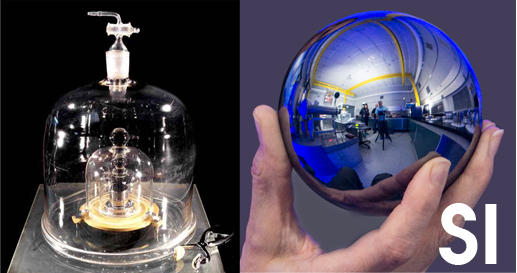World Metrology Day. Constant evolution of the International System of Units

20/05/2018 - May 20 is World Metrology Day, commemorating the anniversary of the signing of the Metre Convention in 1875. This treaty provides the basis for a coherent measurement system worldwide that underpins scientific discovery and innovation, industrial manufacturing and international trade, as well as the improvement of the quality of life and the protection of the global environment.
The theme for World Metrology Day 2018 is Constant evolution of the International System of Units (SI). This theme was chosen because next November 2018, the General Conference on Weights and Measures is expected to agree one of the largest changes to the International System of Units (the SI) since its inception.
The proposed changes are based on the results of research into new measurement methods that have used quantum phenomena as the basis for standards that are fundamental. The SI will be based on a set of definitions each linked to the laws of physics.
One of the main changes expected in this year is the new definition of the kilogram. The kilogram (kg) is the base unit of mass in the International System of Units (SI), and it is defined as being equal to the mass of the International Prototype of the Kilogram (IPK), which is a cylinder of platinum-iridium alloy stored by the International Bureau of Weights and Measures at Saint-Cloud, France, making the IPK the primary standard for virtually all units of mass on Earth
The kilogram was originally defined as the mass of a litre (cubic decimetre) of water at its freezing point. That was an inconvenient quantity to precisely replicate. Late 18th century a platinum artefact was fashioned as a standard for the kilogram. That artefact, named International Prototype of Kilogram, IPK, has been the standard of the unit of mass for the metric system ever since Meter Convention in May 20 of 1875.
The IPK has some replicas which transfer this primary standard. After years it was discovered a problem because IPK diverged from its replicas by 50 µg (micrograms), since their manufacture late in the 19th century. This has led to calls to replace the artefact with a standard defined in terms of invariant constants of nature.
The new definition of kilogram and other derived units are expected in November 2018 at the 26th General Conference on Weights and Measures (CGPM) that the new definitions will to come into force on 20 May 2019.
Across the world, National Metrology Institutes continually advance measurement science by developing and validating new measurement techniques at whatever level of sophistication is needed. The national metrology institutes participate in comparisons coordinated by the Bureau International des Poids et Mesures (BIPM) to ensure the reliability of measurement results worldwide.
The BIPM also provides a forum for its Member States to address new measurement challenges. The International Organization of Legal Metrology (OIML) develops International Recommendations, the aim of which is to align and harmonize requirements worldwide in many fields.
World Metrology Day recognizes and celebrates the contribution of all the people that work in intergovernmental and national organizations throughout the year on behalf of all.
We recommend this interesting video about metrology: CLICK HERE
The theme for World Metrology Day 2018 is Constant evolution of the International System of Units (SI). This theme was chosen because next November 2018, the General Conference on Weights and Measures is expected to agree one of the largest changes to the International System of Units (the SI) since its inception.
The proposed changes are based on the results of research into new measurement methods that have used quantum phenomena as the basis for standards that are fundamental. The SI will be based on a set of definitions each linked to the laws of physics.
One of the main changes expected in this year is the new definition of the kilogram. The kilogram (kg) is the base unit of mass in the International System of Units (SI), and it is defined as being equal to the mass of the International Prototype of the Kilogram (IPK), which is a cylinder of platinum-iridium alloy stored by the International Bureau of Weights and Measures at Saint-Cloud, France, making the IPK the primary standard for virtually all units of mass on Earth
The kilogram was originally defined as the mass of a litre (cubic decimetre) of water at its freezing point. That was an inconvenient quantity to precisely replicate. Late 18th century a platinum artefact was fashioned as a standard for the kilogram. That artefact, named International Prototype of Kilogram, IPK, has been the standard of the unit of mass for the metric system ever since Meter Convention in May 20 of 1875.
The IPK has some replicas which transfer this primary standard. After years it was discovered a problem because IPK diverged from its replicas by 50 µg (micrograms), since their manufacture late in the 19th century. This has led to calls to replace the artefact with a standard defined in terms of invariant constants of nature.
The new definition of kilogram and other derived units are expected in November 2018 at the 26th General Conference on Weights and Measures (CGPM) that the new definitions will to come into force on 20 May 2019.
Across the world, National Metrology Institutes continually advance measurement science by developing and validating new measurement techniques at whatever level of sophistication is needed. The national metrology institutes participate in comparisons coordinated by the Bureau International des Poids et Mesures (BIPM) to ensure the reliability of measurement results worldwide.
The BIPM also provides a forum for its Member States to address new measurement challenges. The International Organization of Legal Metrology (OIML) develops International Recommendations, the aim of which is to align and harmonize requirements worldwide in many fields.
World Metrology Day recognizes and celebrates the contribution of all the people that work in intergovernmental and national organizations throughout the year on behalf of all.
We recommend this interesting video about metrology: CLICK HERE